In the competitive landscape of the restaurant industry, the role of kitchen equipment, especially for items like panini presses, is increasingly significant. As diners’ tastes evolve, the demand for high-quality, reliable, and innovative cooking tools grows. This article delves into the world of restaurant-grade panini presses, exploring the impact of private labeling on suppliers and the market trends shaping the future of this niche sector.
The Rise of Panini Presses in European and American Restaurants
The culinary landscape in Europe and the United States has undergone a remarkable transformation, with one appliance becoming increasingly popular in both casual and fine dining establishments: the panini press. Once a niche item, the panini press has surged in popularity, becoming a staple in the kitchens of eateries across the continent and beyond.
As the demand for quick, delicious, and customizable sandwiches has grown, so too has the need for high-quality, restaurant-grade panini presses. These specialized appliances have found their way into cafes, bistros, and even high-end restaurants, where they are prized for their ability to create perfect panini with every press.
In Europe, the love for sandwiches, particularly the Italian-inspired panini, has been a cultural staple for decades. The continent’s diverse culinary traditions have been perfectly matched by the versatility of the panini press, which can cook a variety of fillings, from simple ham and cheese to complex combinations of vegetables, meats, and spreads.
The United States, known for its fast-paced lifestyle and love for food innovation, has embraced the panini press with the same fervor. From food trucks to gourmet sandwich shops, the demand for a hot, pressed sandwich that can be customized to suit any taste has skyrocketed. The panini press has become a must-have for any establishment looking to offer a quick yet satisfying meal option.
The convenience of the panini press is undeniable. It allows chefs to cook a sandwich in just a few minutes, making it an ideal solution for busy kitchens where speed and efficiency are paramount. The press not only seals in the flavors but also provides a perfect texture, with a golden-brown crust on the outside and a tender, juicy interior.
The rise of the panini press can also be attributed to the growing popularity of the gourmet sandwich movement. Chefs and food enthusiasts alike are experimenting with different ingredients and combinations, pushing the boundaries of what a sandwich can be. The panini press has become a canvas for these culinary artists, allowing them to create unique dishes that appeal to both the eye and the palate.
In recent years, there has been a significant shift towards healthier eating habits, and the panini press has been a key player in this trend. Its ability to cook ingredients without the need for added fats or oils has made it a favorite among health-conscious consumers. From whole-grain breads to lean proteins and fresh vegetables, the panini press is a versatile tool for creating nutritious and delicious meals.
The technology behind the panini press has also evolved. Modern models come with adjustable heat settings, allowing chefs to tailor the cooking temperature to the specific requirements of their ingredients. Some presses even feature non-stick surfaces, which reduce the need for butter or oil and make cleaning a breeze.
Another factor contributing to the rise of the panini press is the rise of foodie culture. With social media platforms like Instagram and Pinterest, where food photos are shared and admired by millions, the panini press has become a symbol of culinary creativity. Chefs and home cooks alike are eager to showcase their skills and share their recipes, and the panini press is a key tool in their arsenal.
In the commercial kitchen, the panini press has become a favorite among line cooks and sandwich artists. Its compact size makes it easy to integrate into existing kitchen layouts, and its consistent results ensure that every sandwich is cooked to perfection. The press has also become a favorite among food service operators looking to differentiate their menu offerings and attract a wider customer base.
As the demand for panini presses continues to grow, manufacturers are responding with an array of new models and features. From countertop units to integrated appliances, the options are endless. This has created a competitive market where quality, innovation, and price are all factors that customers consider when making a purchase.
In conclusion, the rise of the panini press in European and American restaurants is a testament to the changing face of the food industry. It reflects a shift towards convenience, customization, and health, all while maintaining the joy of sharing a delicious meal. As the trend for gourmet sandwiches persists, the panini press is poised to remain a staple in kitchens worldwide.
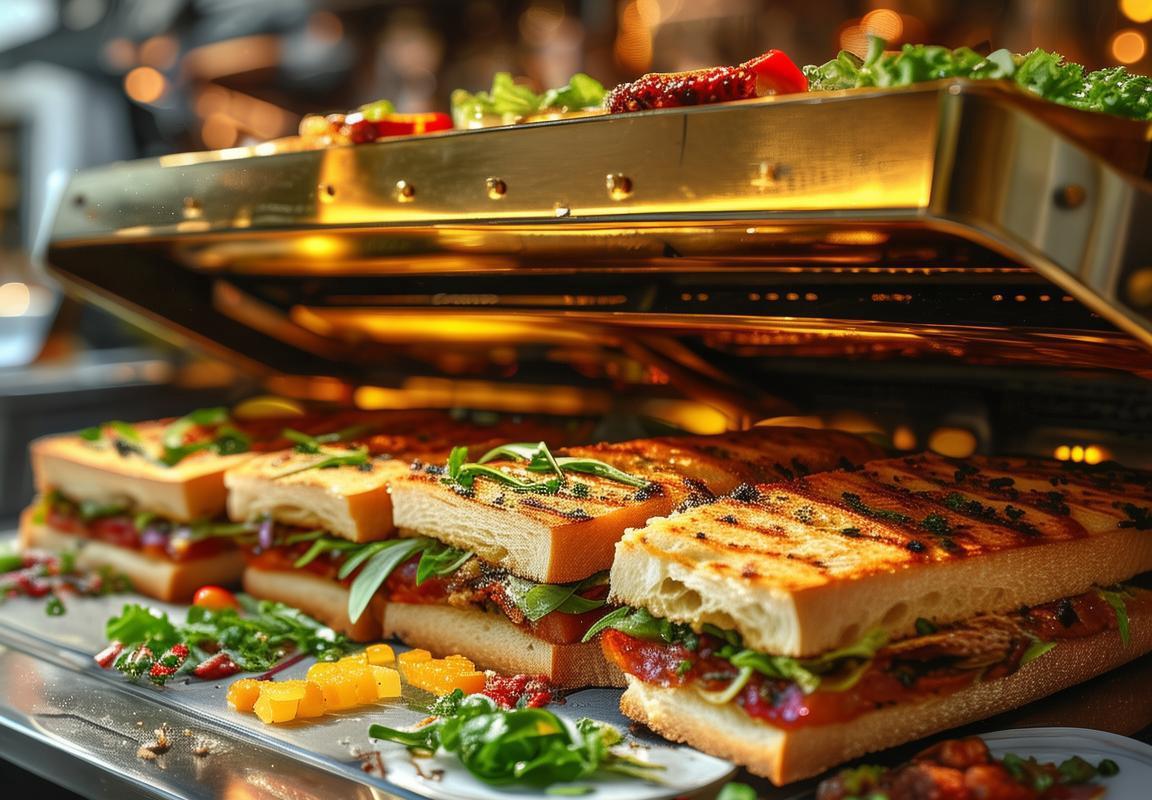
Understanding Restaurant Grade Panini Presses: What Makes Them Special?
In the bustling kitchens of European and American restaurants, a new wave of culinary innovation has taken hold, with the panini press emerging as a staple in the quest for perfect pressed sandwiches. These aren’t your average home appliances; restaurant-grade panini presses are a breed apart, designed to withstand the rigors of professional cooking environments. Let’s delve into what sets them apart.
The construction of a restaurant-grade panini press is a testament to durability and precision. These units are typically made from high-quality stainless steel, which not only ensures longevity but also maintains a hygienic surface that’s easy to clean. The heating elements are designed to distribute heat evenly across the press, crucial for achieving that perfect golden-brown crust on both sides of the sandwich.
One of the standout features of these presses is their ability to handle a variety of bread types and thicknesses. Whether it’s a delicate ciabatta or a hearty focaccia, restaurant-grade presses can accommodate different sandwich sizes and shapes, making them versatile tools for chefs who want to offer a diverse menu. The adjustable pressure settings allow for a perfect seal, ensuring that the flavors are locked in while the textures are preserved.
The temperature control is another area where restaurant-grade presses excel. These units often come with precise temperature settings, allowing chefs to tailor the cooking process to the specific requirements of each sandwich. From a warm, melt-in-your-mouth grilled cheese to a crispy, charred panini, the ability to control the heat is key to achieving the desired outcome.
Safety is paramount in commercial kitchens, and restaurant-grade panini presses are equipped with features that minimize risks. Overheat protection is a standard feature, preventing damage to the unit and potential burns to the chef. Some models even include a safety lock to prevent accidental operation, ensuring that the press is only used when it’s intended to be.
The design of these presses is not just about functionality; it’s also about efficiency. Many restaurant-grade panini presses are compact, saving valuable counter space in busy kitchens. Their sleek, modern look also fits seamlessly into the aesthetic of contemporary dining establishments.
In terms of ease of use, these presses are a breeze to operate. The intuitive controls make it simple to select the desired temperature and pressure, while the non-stick surfaces ensure that sandwiches release cleanly without sticking. This ease of use is particularly important in high-volume settings where speed and efficiency are critical.
The build quality of restaurant-grade panini presses is second to none. These units are designed to withstand the constant use and rigorous cleaning routines of a commercial kitchen. The hinges are reinforced, the handles are heat-resistant, and the overall design is robust enough to handle the demands of a busy kitchen without compromising on performance.
For those looking to offer a premium dining experience, the ability to customize is key. Restaurant-grade panini presses often come with a variety of press plates, allowing chefs to add unique textures and patterns to their sandwiches. This level of customization can elevate a simple sandwich into a work of art that delights the senses.
In the world of commercial cooking, consistency is king. Restaurant-grade panini presses are engineered to deliver consistent results batch after batch. This reliability is essential for restaurants aiming to provide a consistent dining experience to their customers, regardless of the time of day or the number of orders.
The versatility of these presses extends beyond sandwiches. Many chefs use them to prepare a variety of other items, from grilled vegetables and proteins to even small desserts. The ability to cook a wide range of foods on the same unit is a significant advantage for busy kitchens looking to streamline their operations.
In conclusion, the special qualities of restaurant-grade panini presses lie in their durability, versatility, precision, and safety. These appliances are not just tools for cooking; they are investments in the quality and consistency of the food served in European and American restaurants. As the demand for high-quality, fast-casual dining continues to grow, these presses are becoming an indispensable part of the kitchen toolkit.
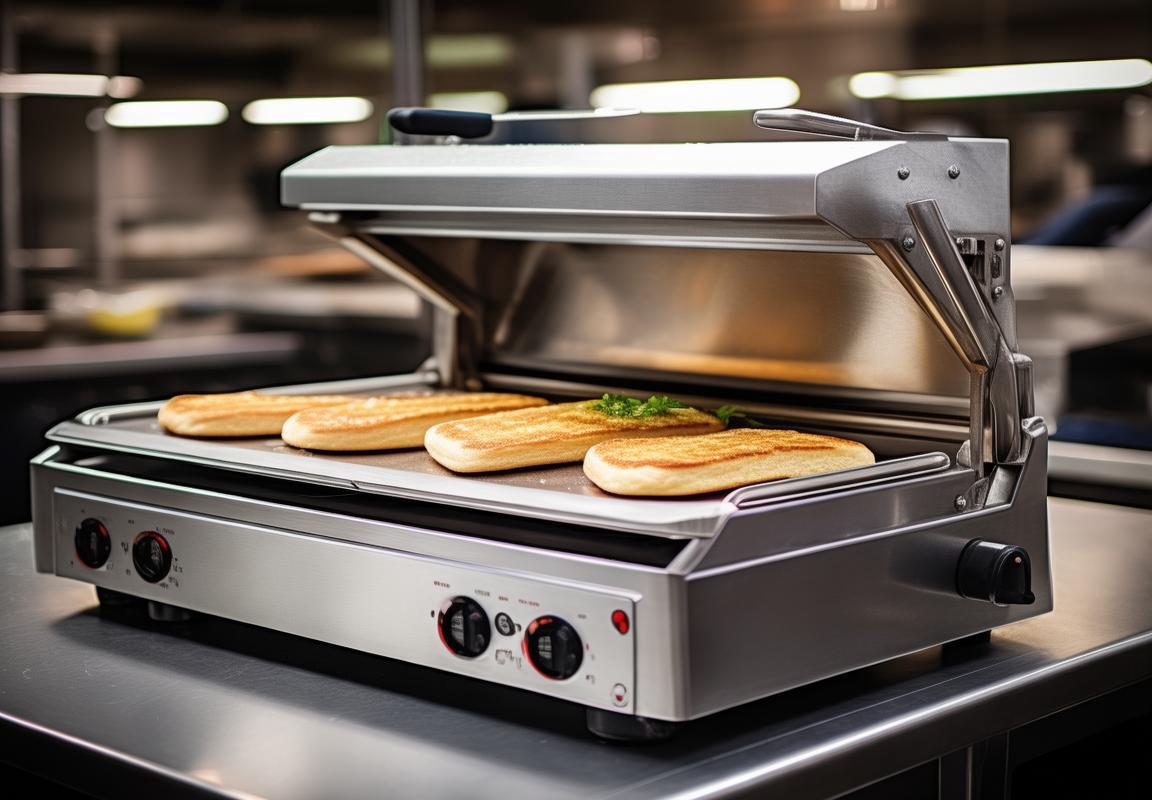
Why Private Label is a Game-Changer for Restaurant Suppliers
Private label offerings have long been a staple in the retail world, but their impact on the restaurant supply sector is particularly transformative. Here’s why private label has become a game-changer for restaurant suppliers:
The Niche Appeal of Private LabelPrivate label products are tailored to meet specific needs or preferences, often offering a unique selling proposition that resonates with a particular segment of the market. For restaurant suppliers, this niche appeal means they can cater to the exact requirements of a diverse range of eateries, from mom-and-pop diners to upscale restaurants.
Enhanced Brand LoyaltyWhen a restaurant chooses to offer private label products, they are essentially creating a brand within their own brand. This not only reinforces the restaurant’s identity but also fosters a sense of loyalty among patrons. Customers who identify with the restaurant’s brand are more likely to remain loyal, leading to repeat visits and increased sales.
Cost-Effective SolutionsPrivate labeling can significantly reduce costs for restaurant suppliers. By producing items under their own brand, suppliers can negotiate better pricing with manufacturers, eliminate middlemen, and pass those savings on to their customers. This cost-effectiveness is crucial in a competitive market where pricing can be a deciding factor for both suppliers and restaurants.
Customization and Quality ControlOne of the most compelling reasons for restaurant suppliers to embrace private labeling is the ability to customize products. This allows suppliers to ensure that the quality and specifications meet the exact standards of their restaurant clients. From the type of materials used in cookware to the specific features of a panini press, customization can be the difference between a standard product and one that truly stands out.
Increased Market AccessPrivate label products open up new market opportunities for restaurant suppliers. They can distribute their branded goods not only to individual restaurants but also to grocery stores, specialty shops, and online platforms. This expanded reach can lead to a more diverse customer base and a stronger presence in the market.
Building a Unique Selling PropositionIn a saturated market, a unique selling proposition (USP) can set a restaurant supplier apart. Private labeling enables suppliers to create products that align with the latest trends or fulfill specific market gaps. Whether it’s a high-tech panini press with adjustable heat settings or a gourmet seasoning blend that complements local cuisine, a strong USP can drive sales and differentiate the supplier from competitors.
Strengthening Supplier-Restaurant RelationshipsPrivate labeling fosters a closer relationship between suppliers and their restaurant clients. When suppliers understand the specific needs of their clients, they can provide more personalized service. This can lead to long-term partnerships based on trust and mutual growth, as suppliers become a go-to source for quality products and innovative solutions.
Adapting to Changing Market DemandsThe restaurant industry is known for its rapid changes. Private labeling allows restaurant suppliers to quickly adapt to these changes. Whether it’s a shift in consumer preferences, a new health trend, or an evolving regulatory landscape, suppliers can respond with customized products that address these shifts, ensuring their clients stay competitive.
Marketing and Brand BuildingPrivate label products offer an opportunity for restaurant suppliers to engage in marketing and brand building. By developing a strong brand identity and marketing strategy around their private label offerings, suppliers can create a narrative that resonates with their target audience. This can lead to increased brand recognition and a positive perception in the eyes of both restaurants and consumers.
The Potential for InnovationThe ability to create private label products allows suppliers to innovate. They can experiment with new designs, materials, and functionalities, pushing the boundaries of what’s possible in the restaurant equipment and supply market. This innovation can lead to better products and services, ultimately benefiting both the supplier and the restaurants they serve.
In conclusion, private labeling has become a game-changer for restaurant suppliers by offering niche appeal, enhanced brand loyalty, cost-effective solutions, customization, increased market access, a unique selling proposition, strengthened relationships, adaptability to market demands, marketing opportunities, and the potential for innovation. As the industry continues to evolve, the strategic use of private labeling is likely to remain a pivotal strategy for suppliers looking to thrive in the dynamic world of restaurant supplies.

Key Features to Look for in a Private Label Restaurant Grade Panini Press
In the competitive world of restaurant supplies, selecting the right private label restaurant grade panini press can be a game-changer. These presses are not just tools of the trade; they are the heartbeat of a sandwich shop or café. Here are some key features to consider when choosing a private label panini press that will elevate your business:
-
Sturdy Construction: The foundation of a great panini press starts with a robust build. Look for models made from high-quality materials like stainless steel, which not only ensures durability but also maintains a hygienic and professional appearance.
-
Even Heat Distribution: A private label panini press should be able to distribute heat evenly across the sandwich. This is crucial for achieving that perfect, golden-brown crust on both sides of the bread. Features like a thick, flat plate and precise temperature control contribute to this evenness.
-
Adjustable Temperature Settings: Different types of bread and fillings require varying levels of heat. A press with adjustable temperature settings allows for versatility, ensuring that every sandwich is cooked to perfection, regardless of its ingredients.
-
Large Plate Surface: A larger plate surface means you can cook more sandwiches at once, increasing your efficiency and throughput. This is especially important for busy restaurants where speed is key to customer satisfaction.
-
Non-Stick Coating: A non-stick coating on the plates makes it easier to release the sandwich once it’s done. This not only saves time but also prevents food from sticking, which can be a common issue with cheaper models.
-
Safety Features: Safety should never be compromised. Look for a panini press with features like a cool-to-the-touch exterior, automatic shut-off to prevent overheating, and a locking mechanism to keep it secure during transportation.
-
Easy to Clean: After a long day of cooking, the last thing you want is a complicated cleaning process. A private label panini press with removable plates and a non-stick surface makes cleaning a breeze, saving time and effort.
-
Brand Identity: Since you’re opting for a private label option, it’s important that the panini press reflects your brand’s identity. Custom branding can include your logo, colors, and any other design elements that align with your restaurant’s aesthetic.
-
Warranty and Customer Service: A reputable manufacturer will offer a warranty for their products, providing peace of mind in case of any defects. Additionally, reliable customer service is essential for addressing any issues promptly.
-
Energy Efficiency: In an era where sustainability is a major concern, choosing an energy-efficient panini press can help reduce your restaurant’s carbon footprint. Look for models that are designed to use less power without compromising performance.
-
Portability and Storage: If your restaurant needs to move the panini press around or store it when not in use, consider its portability. Some models come with features like handles and compact designs that make them easier to move and store.
-
Customer Feedback: Before making a final decision, read customer reviews and feedback. This can provide insights into the real-world performance of the panini press and help you make an informed choice.
-
Cost-Effectiveness: While it’s important to invest in a high-quality panini press, it should also be cost-effective in the long run. Consider the initial investment against the expected lifespan and the potential savings from fewer repairs and replacements.
-
Innovation and Technology: Some private label panini presses come with innovative features like digital temperature controls, which can be more precise than mechanical dials. These advancements can make the cooking process more intuitive and efficient.
-
Customization Options: Depending on your specific needs, some manufacturers offer customization options for private label panini presses. This could include different plate sizes, heating elements, or even special features that cater to your menu.
By focusing on these key features, you can ensure that the private label restaurant grade panini press you choose will not only meet your operational needs but also enhance the overall dining experience for your customers.
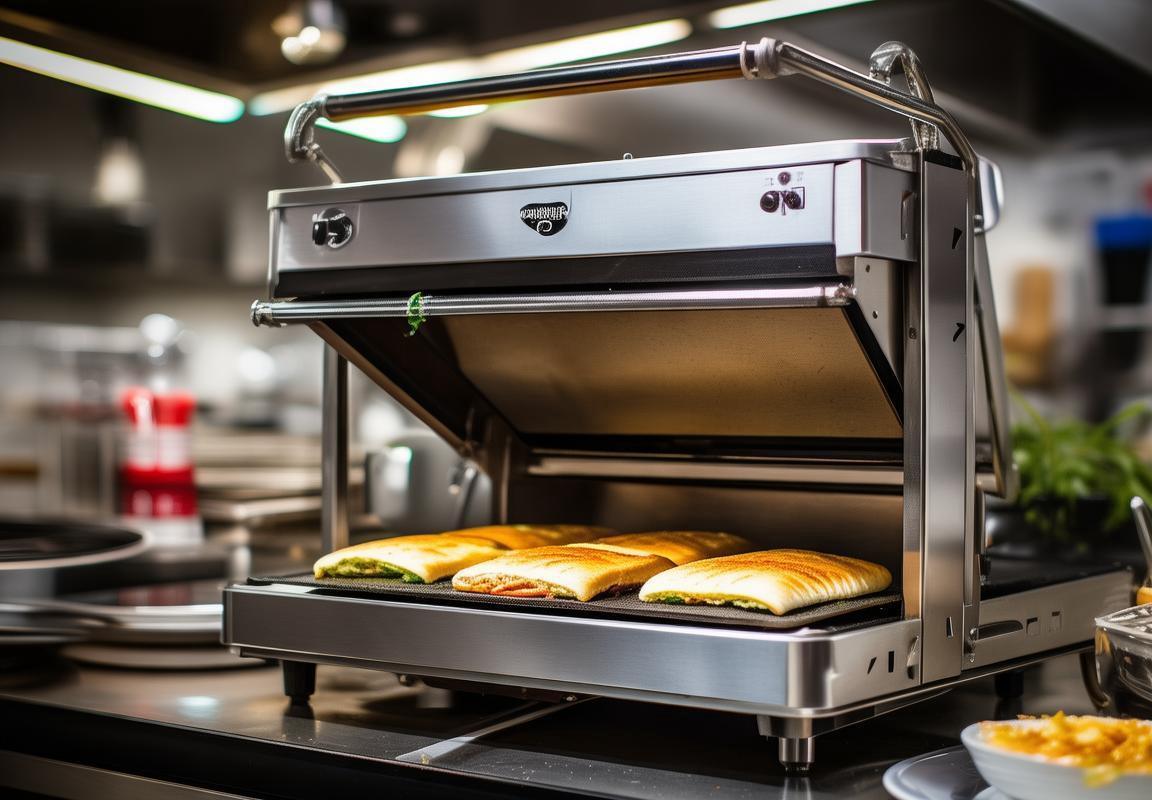
Market Analysis: Trends and Growth Projections for the Panini Press Market
In the ever-evolving culinary landscape, the demand for quality and efficiency in commercial kitchen equipment has surged. Among these tools, the panini press has emerged as a must-have for many restaurants. Let’s delve into the trends and growth projections for the panini press market, examining the factors that are shaping its trajectory.
The surge in health consciousness among consumers has driven a significant shift towards healthier, heartier options. Panini presses offer a perfect solution, allowing chefs to create a variety of open-faced sandwiches that can be customized with fresh ingredients. This versatility has not gone unnoticed by the market, which is witnessing a steady increase in the sales of these versatile appliances.
Technology has also played a pivotal role in the growth of the panini press market. Modern models are equipped with features that make them more user-friendly and efficient. From adjustable heat settings to non-stick surfaces that ensure even cooking, these advancements have made panini presses a favorite among professional chefs. The integration of smart technology, such as digital displays and programmable settings, has further solidified their position as a staple in the commercial kitchen.
The rise of gourmet food culture has also contributed to the market’s growth. As consumers seek out unique dining experiences, restaurants have responded by offering specialty panini with an array of flavors and ingredients. This demand has spurred manufacturers to innovate, leading to a diverse range of panini presses that cater to different cooking styles and preferences.
Another key factor in the market’s expansion is the increasing number of food trucks and pop-up restaurants. These mobile dining options often rely on compact, portable equipment that doesn’t compromise on quality. Panini presses fit this bill perfectly, providing a way to offer a range of sandwiches that appeal to a wide audience.
The global trend towards convenience has also had a significant impact on the panini press market. As consumers look for quick, satisfying meals, the ability to prepare a panini in just a few minutes becomes increasingly attractive. This convenience factor has led to a rise in the sales of countertop models, which are perfect for busy cafes, delis, and convenience stores.
In terms of growth projections, the panini press market is expected to see substantial expansion in the coming years. One of the primary drivers of this growth is the rising middle class in developing countries, who are increasingly looking for Western-style dining experiences. As their disposable incomes rise, so does their demand for commercial-grade kitchen appliances, including panini presses.
Demographic shifts are also playing a role in the market’s growth. The aging population in many countries is leading to a greater emphasis on health and wellness, which in turn drives the demand for nutritious and convenient food options. Panini presses offer a solution that checks both these boxes, making them a staple in many kitchens.
Furthermore, the rise of social media and influencer culture has had a profound effect on the panini press market. Chefs and restaurateurs are constantly seeking new ways to engage with their customers, and the visually appealing nature of panini sandwiches makes them perfect for social media promotion. This has led to a greater focus on the presentation of panini, driving innovation in both the design and functionality of panini presses.
In conclusion, the panini press market is experiencing a period of significant growth, driven by a combination of factors including health consciousness, technological advancements, gourmet food trends, and the demand for convenience. As the market continues to evolve, it’s likely that we’ll see further innovation and a wider variety of options available to cater to the diverse needs of the culinary industry.
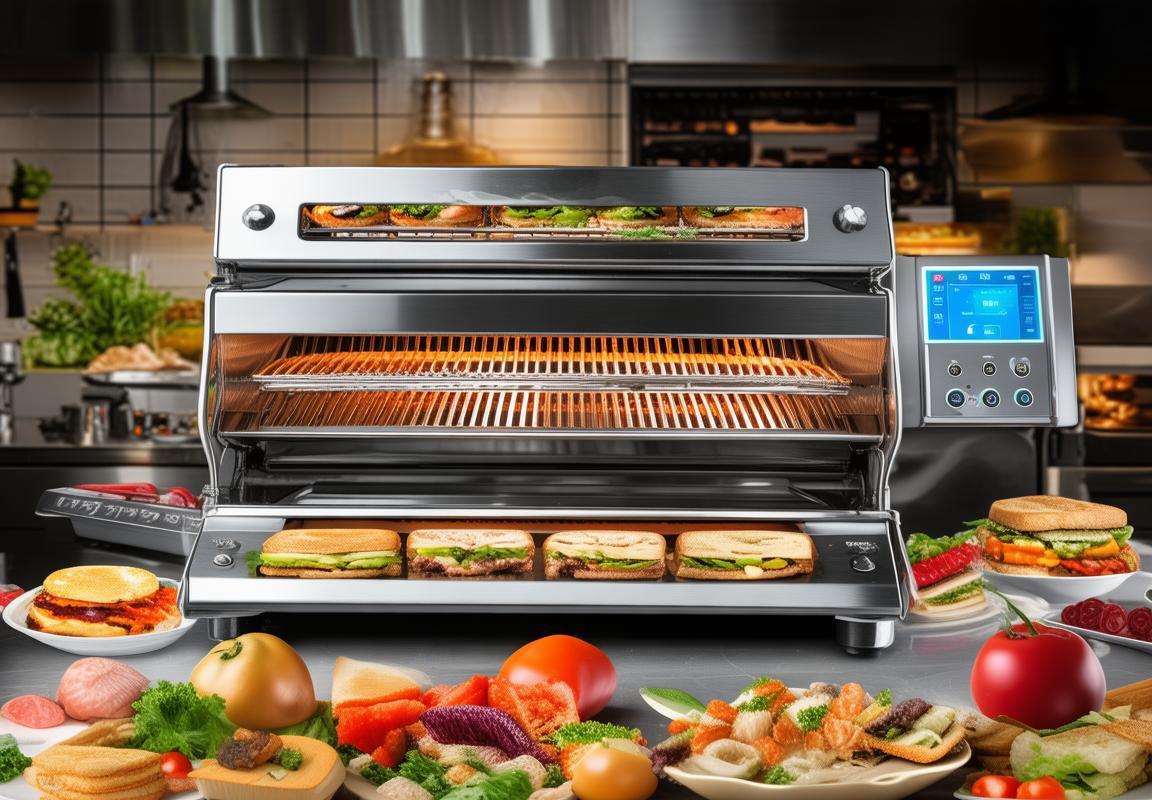
Choosing the Right Manufacturer: What to Consider
When selecting a manufacturer for your private label restaurant grade panini presses, there are several crucial factors to take into account to ensure that you partner with a supplier that meets your quality standards and business needs. Here’s a closer look at what to consider:
The Quality of MaterialsHigh-quality materials are the foundation of a durable and effective panini press. Look for manufacturers that use stainless steel components for their presses, as they are not only resistant to corrosion but also maintain their temperature evenly, which is essential for achieving the perfect grilled sandwich every time. The hinges, springs, and other mechanical parts should also be robust and designed to withstand heavy use.
Design and Build QualityA well-designed panini press not only looks sleek but also performs better. Consider the following aspects of design and build quality:
- Even Heat Distribution: The heating elements should be evenly spaced and of high quality to ensure that the panini press grills the food consistently, preventing hotspots and cold spots.
- Adjustable Heat Settings: The ability to adjust the heat setting is crucial for different types of bread and fillings. A manufacturer that offers a range of settings will cater to a wider variety of preferences.
- Ease of Use: The controls should be intuitive, and the press should open and close smoothly without requiring excessive force.
- Safety Features: Modern panini presses come with various safety features, such as automatic shut-off, non-slip feet, and cool-to-the-touch handles.
Manufacturing Processes and Quality ControlThe way a manufacturer produces its products is a reflection of the attention to detail and commitment to quality. Here are some aspects to consider:
- Certifications: Look for manufacturers with certifications like ISO 9001, which indicates a commitment to quality management systems.
- In-House Production: Manufacturers with in-house production capabilities can better control the quality of their products from start to finish.
- Continuous Improvement: A manufacturer that invests in research and development to improve its products is likely to offer you the latest technology and innovations.
Customer Service and SupportA reliable manufacturer will offer exceptional customer service and support throughout the partnership:
- Technical Assistance: The manufacturer should provide clear instructions and technical support to help you troubleshoot any issues with the panini presses.
- After-Sales Service: Check if the manufacturer offers warranty coverage and easy replacement parts.
- Responsive Communication: Look for a manufacturer that is responsive to your inquiries and ready to address any concerns promptly.
Flexibility in CustomizationEvery restaurant has unique branding and specific requirements. A manufacturer that offers customization options can help you differentiate your product:
- Branding: The ability to add your logo and branding to the panini press can increase brand recognition and customer loyalty.
- Custom Specifications: Depending on your needs, you may require specific features or sizes. A manufacturer that can accommodate these requests can be a valuable partner.
Pricing and Value for MoneyWhile cost is a significant factor, it’s important to consider the overall value for money:
- Competitive Pricing: Compare prices from different manufacturers to ensure you’re getting a fair deal.
- Long-Term Costs: Consider the cost of maintenance, repairs, and potential replacements over the lifespan of the panini presses.
- Total Package: Sometimes, a slightly higher price can be justified by additional benefits such as superior build quality, better customer service, or extended warranties.
Environmental ResponsibilityIn an era where sustainability is increasingly important, choosing a manufacturer that practices environmental responsibility can be a smart business decision:
- Sustainable Materials: Opt for manufacturers that use environmentally friendly materials and processes.
- Energy Efficiency: A panini press that is energy-efficient not only saves you money but also reduces your carbon footprint.
- Recycling Programs: Some manufacturers offer recycling programs for old equipment, which is a sign of their commitment to the environment.
By carefully evaluating these factors, you can choose a manufacturer that aligns with your business goals and provides you with restaurant-grade panini presses that will meet the demands of your customers and the expectations of your staff.
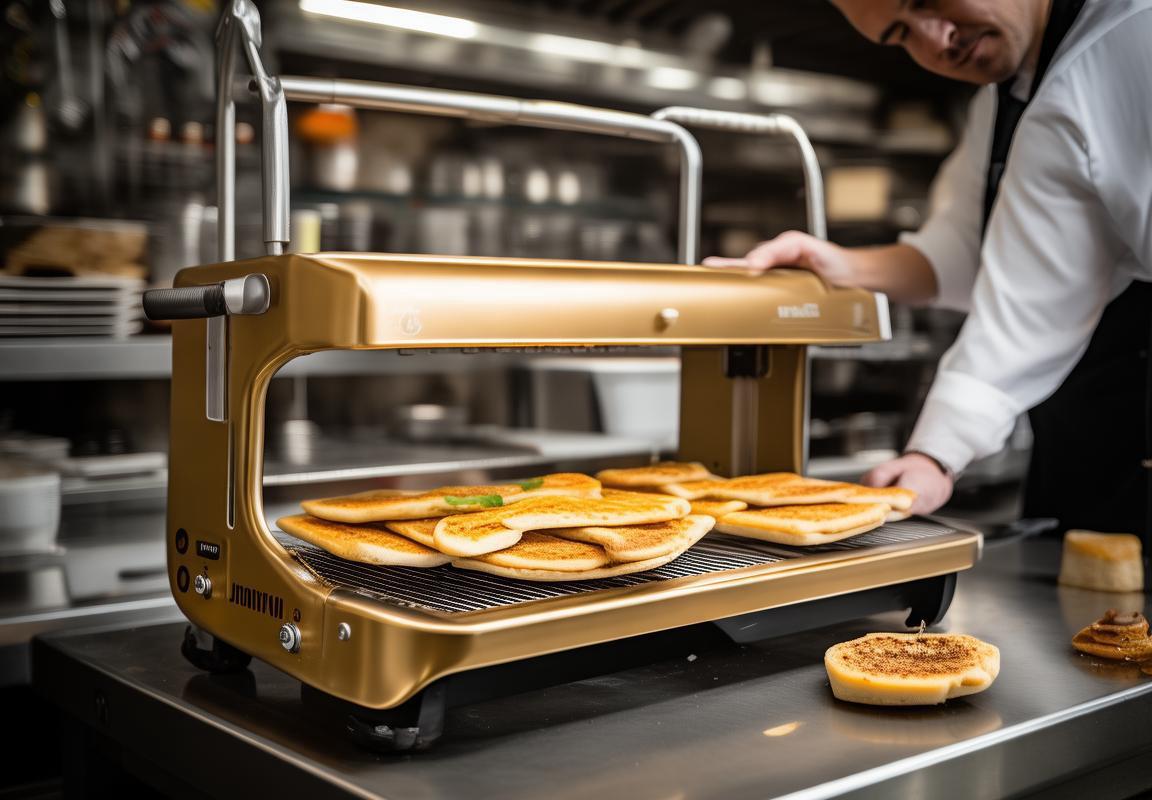
Case Studies: Successful Private Label Partnerships
In the world of private label, successful partnerships can transform a business’s product offerings and brand presence. Here’s a look at a few case studies that showcase the benefits of such collaborations:
-
Customized Cuisine: A local café decided to venture into the private label market by offering a line of gourmet sandwiches. They partnered with a reputable manufacturer who understood their vision for high-quality, artisanal products. The manufacturer’s expertise in creating custom sandwich presses enabled the café to offer a unique, consistent product that set them apart from competitors.
-
Health and Wellness Branding: A health-conscious brand sought to expand its product line with a private label line of wellness-focused snacks. They collaborated with a manufacturer who specialized in organic and low-sugar alternatives. The partnership resulted in a successful launch of a range of energy bars and granola that resonated with the brand’s target demographic, emphasizing clean ingredients and health benefits.
-
Cultural Flavors: An international food retailer wanted to tap into the growing market for ethnic cuisine by offering a private label line of Indian-inspired products. They teamed up with a manufacturer that had a proven track record in producing authentic Indian spices and ingredients. The result was a line of curry powders, masalas, and ready-to-cook meals that delighted customers seeking a taste of India at home.
-
Sustainability Focus: A sustainable living brand aimed to offer eco-friendly kitchenware, including a private label line of non-stick pans. They partnered with a manufacturer committed to using recycled materials and sustainable production practices. The pans were not only a hit with environmentally conscious consumers but also helped the brand establish itself as a leader in sustainable living products.
-
Innovative Tech Integration: A tech-savvy company wanted to integrate smart technology into kitchen appliances, so they created a private label line of smart cookers. They partnered with a forward-thinking manufacturer who had the capabilities to design and produce these cutting-edge appliances. The collaboration led to a successful product launch that appealed to tech enthusiasts and home cooks looking for convenience and efficiency.
-
Seasonal Offerings: A seasonal market retailer needed a private label line of holiday-themed baking mixes to capitalize on the peak season. They partnered with a manufacturer that could quickly adapt to their needs, offering a variety of festive flavors. The unique product line became a seasonal staple, fostering customer loyalty and repeat business.
-
Global Expansion: An established food brand looking to expand internationally partnered with a manufacturer that had a global reach and distribution network. This allowed the brand to enter new markets with ease, leveraging the manufacturer’s local knowledge and established relationships. The partnership was crucial in the brand’s successful international expansion.
-
Health Food Revolution: A boutique health food shop sought to offer a private label line of organic, gluten-free baked goods. They found a manufacturer that shared their values of organic farming and ethical sourcing. The partnership led to a range of products that catered to the growing demand for healthier, cleaner-label options, solidifying the shop’s reputation as a health food pioneer.
-
Culinary Artisanry: A culinary school wanted to create a line of gourmet sauces and condiments that students could use in their training. They collaborated with a manufacturer who could produce small batches with the same quality as high-end brands. The result was a successful product line that not only enhanced the school’s curriculum but also provided students with marketable products upon graduation.
-
Niche Market Satisfiers: A niche market retailer specializing in vegan and vegetarian products partnered with a manufacturer who could produce a wide array of plant-based alternatives. The collaboration allowed the retailer to offer a comprehensive range of products, satisfying the unique needs of their customer base and becoming the go-to store for plant-based enthusiasts.
These case studies highlight the diverse ways in which private label partnerships can be successful, from niche markets to global expansion, and from health and wellness to culinary innovation. The key to each partnership’s success lies in aligning values, leveraging expertise, and focusing on the end consumer’s needs.
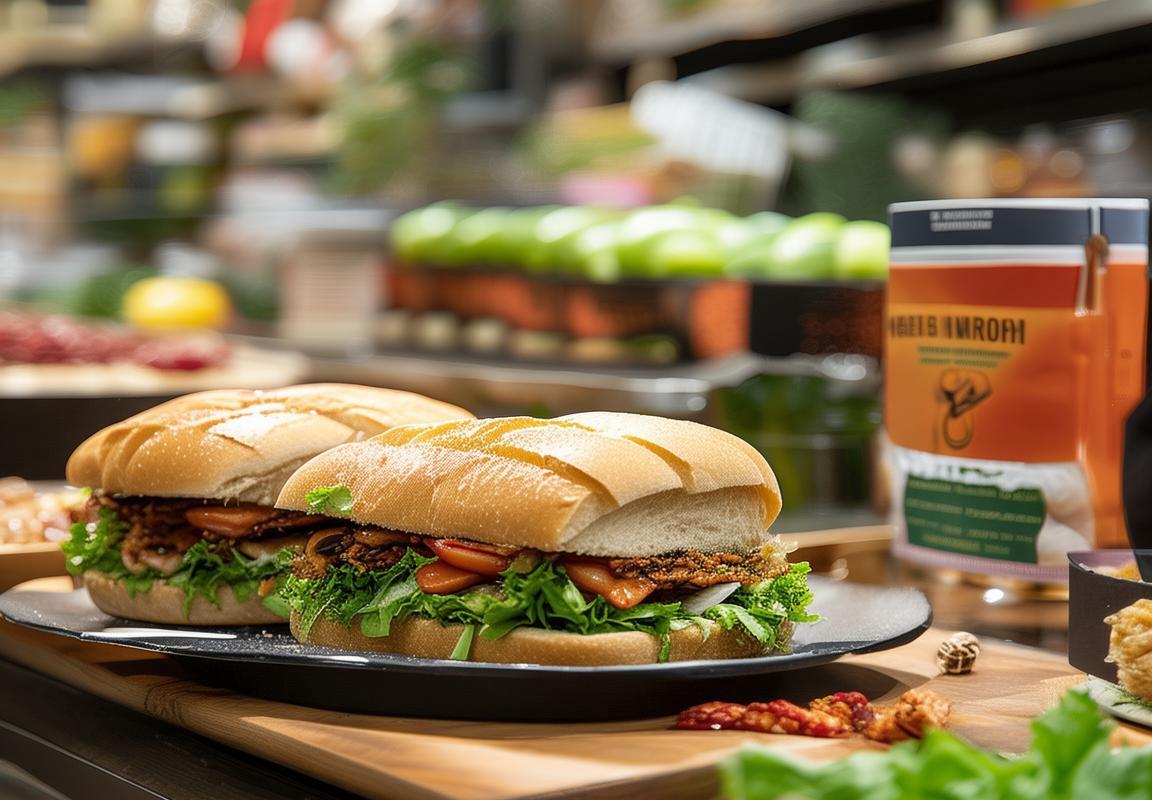
Conclusion: The Future of Private Label Restaurant Grade Panini Presses
In the ever-evolving landscape of the restaurant industry, the rise of private label restaurant grade panini presses has reshaped the way suppliers and restaurateurs approach their equipment needs. These specialized appliances have not only become a staple in many eateries but have also opened up new avenues for suppliers to offer unique value to their clients. Let’s delve into the future of these presses and the trends that are shaping their destiny.
The demand for convenience and quality in fast-casual dining has surged, and private label panini presses have been at the forefront of this trend. These compact, efficient machines have the power to transform a simple sandwich into a gourmet experience, appealing to a wide range of customers. As the market continues to grow, the future of private label restaurant grade panini presses looks promising.
One key factor contributing to the future potential of these presses is the customization they offer. Private label allows suppliers to cater to the specific branding and design preferences of individual restaurants, ensuring that the equipment complements the establishment’s aesthetic and identity. This level of personalization is not just a visual appeal; it also fosters a sense of exclusivity and loyalty among customers.
Innovation in technology is another driving force. As manufacturers strive to keep up with the latest trends, they are incorporating features that enhance efficiency, durability, and ease of use. Smart features, such as digital temperature controls and programmable settings, are becoming standard, allowing chefs to achieve consistent results with minimal effort. The future of private label panini presses will likely see even more advanced technology integrated into these devices.
The market for private label restaurant grade panini presses is also being influenced by the rise of health-conscious consumers. As people seek out healthier eating options, the demand for sandwiches that can be customized with fresh, whole-grain breads and lean proteins is on the rise. This shift in consumer preferences is prompting suppliers to offer presses that can handle a variety of ingredients and cooking styles, from crispy to toasted to grilled.
Another aspect that will play a significant role in the future of private label panini presses is sustainability. As the restaurant industry becomes more environmentally aware, suppliers are looking for ways to reduce their carbon footprint. This could mean offering presses that are made from recycled materials or have energy-efficient designs. By addressing these sustainability concerns, suppliers can appeal to a broader customer base and contribute to a greener future.
The global market for panini presses is also expanding, with opportunities in regions such as Asia and South America. As these areas experience economic growth and an increase in disposable income, the demand for fast-casual dining options is expected to rise. This presents a golden opportunity for private label suppliers to tap into new markets and establish a presence in these burgeoning regions.
The importance of partnerships cannot be overstated. Successful private label partnerships are built on trust, clear communication, and a shared vision. Suppliers must be willing to listen to the needs of their clients and adapt their offerings accordingly. This could mean offering a range of models to suit different types of restaurants or providing exceptional customer service to ensure that the presses are performing at their best.
The future of private label restaurant grade panini presses is also intertwined with the rise of e-commerce. As more businesses turn to online platforms to reach their customers, suppliers can leverage this trend to offer their products directly to restaurateurs. This not only streamlines the purchasing process but also allows suppliers to gather valuable feedback from a wider audience, further informing their product development.
In conclusion, the future of private label restaurant grade panini presses is bright. With a focus on customization, technological innovation, health and sustainability, and strategic partnerships, these presses are poised to become an even more integral part of the restaurant industry. As the market continues to evolve, so too will the offerings from suppliers, ensuring that the panini press remains a versatile and valuable tool in the kitchen.